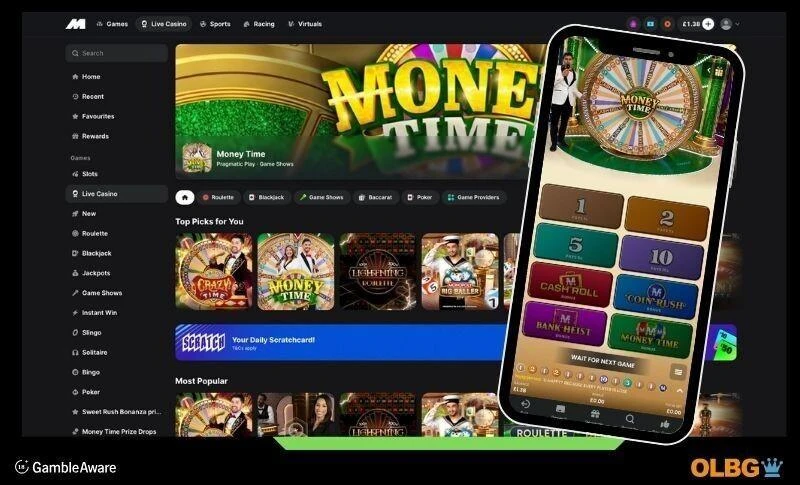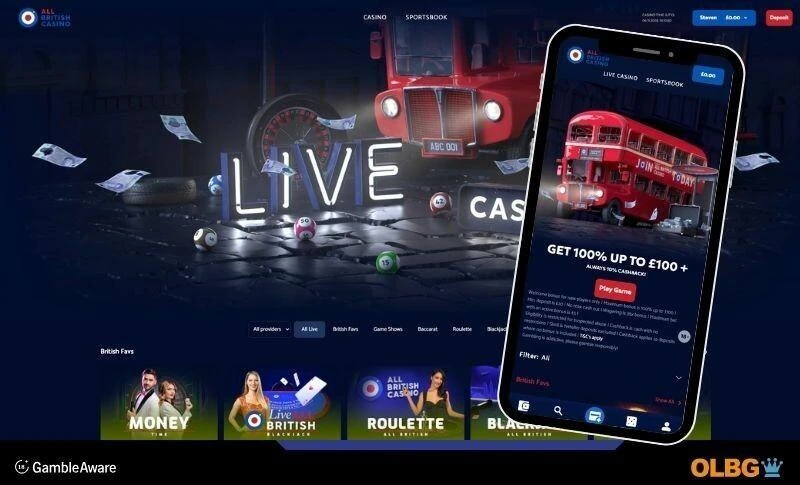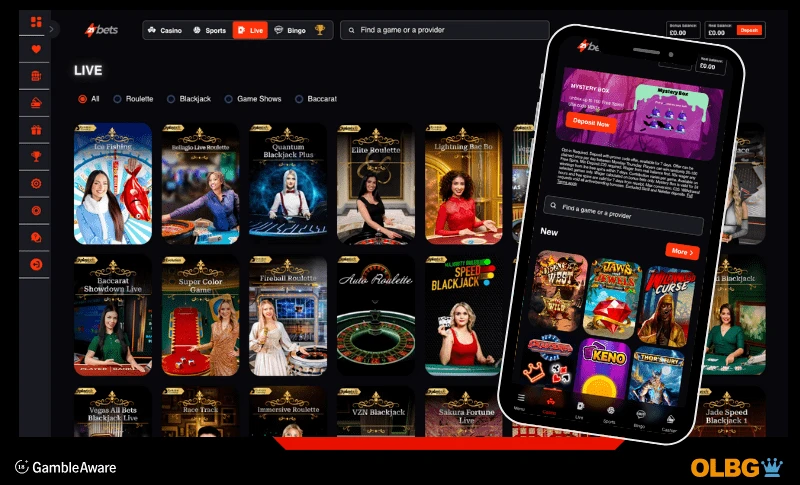Best Casino Sites in the UK - Our Top 10 Online Casinos
With 100's of online casino sites to choose from and new ones coming online all the time, we know how hard it is for you to decide which casino site to try out next.
That is why our online casino experts at OLBG have created this guide for you. They have
- Spent hours researching every casino site
- Completed detailed reviews of each one
- Tried and tested all the aspects which matter to you
- Produced detailed comparison guides
Below is a summary of our expert's top 10 UK casino sites, with an explanation as to why each of these sites has made the list.
Top 10 UK Casino Sites According to OLBG Casino Experts
| Casino Site | Highlight | Key Strengths |
|---|---|---|
| 1. Duelz | 6-minute withdrawals | Weekly cashback |
| 2. BetMGM | Quick KYC with a huge game library | 2500+ games, Live dealers |
| 3. 32Red | Fast payout and award-winning support | 3500+ games, instant PayPal |
| 4. Unibet | best all-rounder for mobile apps and variety | 3750+ games, quick withdrawals |
| 5. Neptune Play | Slot Depth - Easy banking | 2100+ games, instant payouts |
| 6. Midnite | Mobile first - good live dealer studio | Pragmatic live dealers, fast payouts |
| 7. Pub casino | UK focus with quick banking | 2000+ games 24/7 support |
| 8. All British Casino | Live Dealer Choice + Cashback | 2000+ games, cashback and fast withdrawals |
| 9. SpinYoo | Great game variety | 2750+ games + big progressives |
| 10. Buzz Casino | Lots of jackpots and app-friendly | 2400+ games |
1. Duelz Casino
When we have questioned users about what they want from a casino, it's often not the game choice or the look of the site, but how quickly they can withdraw their winnings. Duelz has an average payout time of 6 minutes from request to the money landing in your account. And to most casino players, that's priceless.
The great thing is, Duelz also back this up with a huge games library, whether that be live table games or slots from the biggest slot studios
Pros
Instant Withdrawals (6 minute average)
Built for mobile, works everywhere
10% weekly cashback, Duelz Prizes & tournaments
Cons
Site navigation can be clunky

I started using Duelz because I heard the game choice was great, it was a huge bonus when I realised my withdrawals were being done instantly.
David Coleman, Your Casino Guide at OLBG
2. BetMGM Casino
We know how much hassle the account verification is for players and how frustrating the document uploads can be - we get so many comments in user reviews about this. Step forward BetMGM with one of the easiest sign up processes and KYC options which can have you up and running in moments, without account blockages.
Throw into the mix a fantastic selection of slot games, table games and live studio stuff like Crazy Time, and they've pretty much got everything you need including ongoing promotions every week.
Pros
2,500+ slots and casino games
Big-name live dealer action
Great deposit and withdrawal variety
Cons
Better jackpot slot variety

BetMGM grabbed me because of the welcome offer, but actually behind that I really like the regular promotions and slots.
David Coleman, Your Casino Guide at OLBG
3. 32Red Casino
Having played so many games at casinos over the years, and specifically looking for new releases, finding a casino that has exclusive games is always exciting for our team. 32Red have exclusive versions of games you won't find anywhere else as well as early releases, which is something we love to see.
With tons of jackpot slots to choose from as well, there is more than enough variety before we get into the huge table game and live dealer library on offer. Regular promotions will keep you engaged
Pros
3,500+ slots with lots of exclusives
12-hour withdrawals with no fees
Mobile apps & 24/7 customer support
Cons
Limited range of banking options

The slots are great but I really like 32Red for the live casino. I play Crazy time here mostly, and a bit of blackjack
David Coleman, Your Casino Guide at OLBG
4. Unibet Casino
Unibet would be better known for sports but we really like the way the games are easy to find. They have exclusive releases from studios that you can only play at Unibet for a couple of weeks before general release.
We all like to see our withdrawals back in our accounts quickly. Unibet have never let us down in that regard, although, if you are lucky to need a ‘big’ withdrawal there may be a 24 hour wait. But once document upload and verification is complete, everything is a breeze.
Pros
3,750+ slots including 250+ jackpot slots & exclusives
iOS & Android mobile apps
24/7 support & under 12-hour withdrawals
Cons
No PayPal available

I've had a couple of big withdrawals at Unibet which have been really easy compared with some other online casinos. I feel confident I will get my winnings quickly.
David Coleman, Your Casino Guide at OLBG
5. Neptune Play Casino
So we come to one of our personal favourite online casinos for slots at least. What we like about Neptune is that they try to deliver exactly what the player wants. Highlighting new released games where you want to see them, and through your play, they understand your favourites and titles you may like that are similar or from the same providers.
Those quick payouts of your withdrawal requests again help score them highly and there are always promotions on the go, and tournaments to join in with.
Pros
Massive game library: 2,000+ slots, live dealer, roulette, blackjack
Fee-free banking: deposits and withdrawals with no hidden costs
Easy-to-use search and filters
Cons
Less bingo and poker content
No dedicated mobile app

Neptune actually made some changes to their menu based on feedback I gave them. That impressed me and got my loyalty for sure.
David Coleman, Your Casino Guide at OLBG
6. Midnite Casino
We've been a big fan of Midnite since they arrived on the scene. Very much like Neptune, they have a simple interface, making finding the games you want to play nice and easy, providing ‘top picks for you’ based on your play history.
We particularly love the fact you can create a favourites tab on the menu and the rewards section where you can you can find your free spins, vouchers and credits
Pros
Free spins with no win cap
Instant and 24-hour payouts (including PayPal)
Mobile-first design with Android & iOS mobile apps
Cons
Could do with more payment methods
Not many progressive jackpot slots

I just trust Midnite. I've never had any problems with verification or withdrawals. I like that.
David Coleman, Your Casino Guide at OLBG
7. Pub Casino
One of the best things about Pub casino is the branding - very clever. Pub have recently updated the site and it looks really cool.
The branding works well with the Live Dealer section, an area Pub seem to do very well at. This is separated from the main part of the site, where you can browse a huge range of live dealer games, running through the usual blackjack and roulette through to live poker too.
Pros
Over 2,000 slot and casino games
UK-focused with fast, free withdrawals
Great promotions for new and regular players
Cons
Needs more progressive jackpots

Pub feels fun to me, just the theme makes me feel comfortable and I can find everything I want.
David Coleman, Your Casino Guide at OLBG
8. All British Casino
All British Casino is all about the cashback. Always on 10% cashback on your deposits is something we hadn't seen before. We really like the live casino here too and there are thousands of slots to choose from. We didn't think the way the slots are displayed is the best but you can search by game title if you know what you are looking for.
Pros
All British Site Theme
Fantastic selection of games, including live dealers
Good variety of bonuses and promotions
Cons
Hard to find any fault unless we look really hard

I forgot about the cashback for months, and when I finally looked I was quite shocked. That's more about me, but now I only look once in a while and it feels like free money!
David Coleman, Your Casino Guide at OLBG
9. Spinyoo casino
The team have pulled SpinYoo casino into our top ten casino sites off of the back of several aspects, not least of which is the welcome offer. Coupled with the loyalty program and regular promotions, Spinyoo really do offer a place for regular players to feel valued - We don't ask for much more than that.
That's not to say everything you need isn't there, a wide range of live casino options and plenty of slot games too, SpinYoo makes a confident choice in our top ten.
Pros
Instant Withdrawals (6 minute average)
Built for mobile, works everywhere
10% weekly cashback, Duelz Prizes & tournaments
Cons
Site navigation can be clunky

I like SpinYoo for the Pragmatic Play games which come with the chance of the Drops and Wins jackpots too.
David Coleman, Your Casino Guide at OLBG
10. Buzz Casino
Buzz casino are brilliant for jackpot games, they've a huge number of them, so if you are a jackpot hunter, they are very much recommended. On the other hand if you play Blackjack online then Buzz Casino has one of the best range of games to choose from. Dozens upon dozens of live dealer games, or RNG blackjack options to choose from.
We really like the simple sign up process to, that is one thing that really makes it an easy choice
Pros
2,400+ casino games
1-4 hour withdrawal time
Huge range of jackpot slots
Live dealer casino games
Slick website + dedicated mobile apps
Responsive support team via Live Chat
Cons
Customer support not available 24/7
Could do with more withdrawal options
No way to filter games by studio

I like playing on my mobile and they have a good app. Blackjack is my game and I come here first.
David Coleman, Your Casino Guide at OLBG
🆕 New Casino Sites
David Coleman manages and updates our casino site content every day - This task includes adding new casinos to the lists and including them in all of our comparison data to see if they can get into, or even top our top 10 lists.
Here are some of the newest online casinos in the UK that have caught our attention
1. 21Bets - Tons of games and regular promotions

- Wagering req. 10x
- Value/free spin £0.10
- Offer amount £20
#ad. 18+, gambleaware.org, T&Cs Apply
2. Quickbet - Super Quick PayPal transaction and great live dealer options
- Wagering req. 0x
- Value/free spin £0.10
- Offer amount £10
#ad. 18+, gambleaware.org, T&Cs Apply
3. Kachingo – Great slot variety. We have worked directly with them to improve the user experience.
New Casino Sites Reviewed at OLBG
| New Casino Sites | OLBG Rating | Established | Listed on OLBG | UKGC License |
|---|---|---|---|---|
| 21Bets Casino | 4.3 | 2014 | October | 39335 |
| 247Bet Casino | 4.4 | 2025 | August | 52894 |
| Quickbet Casino | 4.3 | 2025 | August | 38758 |
| Slots Temple | 4.4 | 2025 | May | 58086 |
| VoodooDreams | 4.4 | 2016 | May | 48695 |
| Boyle Casino | 4.4 | 1982 | April | 39469 |
| BetZone Casino | 4.4 | 2021 | April | 61997 |
| Smooth Spins | 4.1 | 2022 | April | 39576 |
| Tote Casino | 4.4 | 2020 | April | 54779 |
| Kachingo | 4.3 | 2025 | March | 39483 |
| BetWright Casino | 4.4 | 2025 | March | 64666 |
| Casiku | 4.3 | 2024 | February | 52894 |
| NRG.bet | 4.2 | 2024 | January | 63635 |
| Heart Bingo casino | 4.3 | 2011 | January | 39576 |
All casino sites on this page are licensed by the UK Gambling Commission. Next to the new casino sites listed above you can see their UK Gambling Commission License number, you can also go to this page at the UK Gambling Commission to see the full register of UK licensed casino sites. You should only use licensed casino sites as they offer you a level of protection. A licence shows that the casino meets a level of strict standards, security and responsible gambling. You should be aware of unlicensed casinos and the potential dangers and security risk of them not being covered by UK legislation and law.
Best Casino Sites By Game Type
We have carried out detailed analysis of each casino site to discover what they are good at and where they stand out. These comparison guides can all be accessed from our section on casino game guides.
Below we highlight the winner for each category - the best UK casino site by game type.
Table of Best Casino Sites by Game
| Best for Roulette | Duelz | Massive live roulette variety, perfect for mobile play. |
| Best for Blackjack | Buzz Casino | Extensive blackjack variants, low house edge. |
| Best for Baccarat | VideoSlots | Top-rated baccarat library, numerous live tables. |
| Best for Craps | Duelz | Dedicated craps tables alongside an elite live-dealer network. |
| Best for Slots | Midnite | See our dedicated Slots Page |
| Best for Scratchcards | Monster Casino | Large scratch-card selection, instant-win focus |
| Studio Games | Midnite | Broad selection, reliable mobile performance. |
| Best for Lightning Blackjack | Midnite | Fast play, strong live-dealer quality. |
| Best for Crazy Time | PlayOjo | Engaging show, trusted by live players. |
| Best for Crazy Coin Flip | Neptune Play | Simple, high-payout live bonus game. |
| Best for Dragon Tiger Live | Neptune Play | Quick rounds, great app stability. |
| Best for Funky Time | Midnite | Distinctive show format, excellent engagement. |
| Best for Dream Catcher | Midnite | Reliable live wheel, strong feedback. |
| Best for Monopoly Big Baller | Midnite | Popular brand, high-multiplier action. |
Click on the links in the table to go to the full analysis of the best casino sites for each game type. If there is a game you play regularly then it is worth opening a new casino account by a provider that has a very good offering for that game - that is why we have completed these detailed guides for you.
Best Casino Sites by Features
The best casino site for you might not be about your favourite game, instead you may look for a particular feature such as fast payouts. Our team of casino experts have tested all these areas out to and here are the winners in each category.
Table of Best Casino Sites by Features
| Best for Low Minimum Deposits | Midnite | Low entry limits, perfect for casual players. |
| Best for Cash Back | Duelz Casino | Regular rewards, transparent return-to-player offers. |
| Best for Payouts | Luckland Casino | High payout rates, reliable transaction processing. |
| Best for Fast Withdrawals | Duelz Casino | Quick approvals, consistent same-day payouts. |
| Best for Quick verification and KYC | BetMGM | Smooth onboarding, instant document approval. |
| Best Independant Casino | Midnite | Privately run, innovative design, player-first focus. |
| Best Casino Apps | Casushi | User-friendly app, stable live-gaming performance. |
| Best Live Dealer Casinos | All British Casino | Premier live tables, trusted UK reputation. |
Click on the links in the table to go to the full analysis of each feature. If there is a feature that is important to you or a particularly way of playing online casinos which you favour then understanding the best casino sites in that area will help you - that is why we have completed these detailed guides.
How to Choose the Right Casino Site for You
When you're choosing a new casino site, you’re not just picking a place to play — you’re trusting a company with your time, money, and personal data.
At OLBG, we believe you deserve a platform that’s safe, reliable, and genuinely player-friendly.
Here’s what we look at in every casino we review - and what you should too.
🔒 Trustworthy Casino Sites
We only list UK Gambling Commission-licensed casinos. You’re exposed to risk if they are not.
✅ Licensed casinos must follow strict rules
❌ Unlicensed casinos may not protect your funds or resolve disputes fairly
Always check a casino’s licence status - or just use our trusted list and save the worry.
Trustworthy casinos will be strong on Responsible Gambling. As part of having a UKGC license, casinos must be part of GAMSTOP. If you feel as though your gambling is out of control you can register with GAMSTOP and block yourself from online gambling. This is just one reason why you should only ever bet with UKGC licensed casino sites.
Reputable casinos will also provide lots of tools to help you to do things like set deposit limits and take time out. We have created a full guide to these tools and link to it in the footer on this page.
✅ Reliable Casinos
Not all licensed casinos are equal. Some change their terms without warning. Others delay payments or deliver poor customer service.
We don’t just rate a casino once, we watch for warning signs, review player feedback, and remove or downgrade sites that stop meeting our standards.
In extreme cases, if a site is too risky, we won’t list it at all.
🟢 Low Risk Casino Sites
New casinos can offer exciting features, but smaller companies sometimes carry more risk, especially if they’re still proving themselves.
We look at:
Financial stability
Ownership transparency
Payment reliability
Even if you’ve never heard of the brand, we’ll tell you whether it’s new and growing, or globally established behind the scenes.
🌟 Reputable Casino Sites
The best way to judge a casino? Ask real players.
We’ve collected hundreds of user reviews from OLBG members. They talk about:
Bonus fairness
Customer service experiences
How fast (or slow) payouts really are
This is the kind of insight you can’t get from the homepage of a casino. And it’s right here and free to explore.
👥 Player-Friendly Casino Sites
Hidden fees. Dormant account charges. Delays on withdrawals.
We’ve spent hundreds of hours digging through the fine print so you don’t have to. If there’s something unusual, unfair, or sneaky in a casino’s T&Cs, we flag it.
Our reviews include:
Withdrawal policies and potential charges
Dormancy rules that could drain your balance
Payment methods and timeframes
Any ‘gotchas’ we (or our users) uncover
Everything Else You Want From a Casino Site
Having more than one account and trying them for size is always an alternative to reading our guides. We are aware that some people prefer to do this and take advantage of the welcome offers available. We update our lists of welcome offers daily. You can see them on our casino offers page
Online Casino Deposit Methods
The key to which casino site you use could be down to how you want to fund your account. In this section, we explore the popular funding methods for casino sites and then highlight the best site for each deposit type.
Click the Links for the full guides, next to which we show the category winners - The best casino site for that payment method
Best Pay by Phone Casino Sites - Duelz
Best PayPal Casino Sites - Duelz
Best ApplePay Casino Sites - Buzz Casino
Best Google Pay Casino Sites - Midnite

Frequently Asked Questions
FAQ
UK Casino Sites FAQs
-
1. What are the best UK casino sites in 2025?
The best UK casino sites in 2025 include operators with top ratings for trust, fast payouts, and a wide variety of games. Based on OLBG user reviews and expert testing, standout names include Neptune casino, Midnite casino and Pub casino.
-
2. How do I choose a safe and licensed UK casino site?
Always check for a licence from the UK Gambling Commission (UKGC). Look for SSL encryption, verified payment options, and responsible gambling tools. OLBG only lists UK-licensed and independently tested casino sites.
-
3. What is the newest online casino site in the UK?
As of February 2026, one of the newest UK online casino launches is Kachingo. It offers modern features like instant payouts, fresh game providers, and a mobile-first platform. You can find all newly listed UK casinos on OLBG.
-
4. Which UK casinos have the fastest payouts?
The fastest payout UK casino sites typically process withdrawals within hours using instant banking methods. Casinos like Duelz and Casushi are rated highly for fast, hassle-free withdrawals.
All casinos have very similar payout times. One thing that can speed up payout at any casino is to use an e-wallet solution. Something like PayPal Skrill, Neteller, etc.
-
5. Are UK casino sites mobile-friendly?
Yes, nearly all top-rated UK casino sites work seamlessly on smartphones and tablets. Most have mobile-optimised websites or apps for iOS and Android.
-
6. What types of games can I play at UK online casinos?
You’ll find slots, blackjack, roulette, baccarat, poker, and live dealer games at most UK casinos. Many also offer exclusive titles and game shows from providers like Evolution and Pragmatic Play.
-
7. How are OLBG’s top UK casino sites ranked?
We rank casino sites based on expert reviews and ratings from real players. Key factors include licence status, payout speed, customer support, game selection, and bonus fairness.
-
8. How often does OLBG update the list of top online casino sites?
OLBG constantly updates its list of top online casinos. The frequency isn't specific, but we aim to provide the most relevant and up-to-date information to users when a new UK online casino is launched and makes it through the rigorous testing procedures
-
9. What type of information can I find in the comprehensive reviews on this site?
Comprehensive reviews on OLBG cover significant aspects such as games available, usability of the site, quality of customer services, bonuses on offer, and the withdrawal process.
Summary & Conclusion
When looking for the best casino site for you, the key areas to consider are
- ✅ OLBG experts' analysis of the best sites overall and the best by category, which you are most interested in
- 💬 OLBG user reviews to see what regular casino users say about their experiences at each site
- 💳 The payment methods which you want to use and which sites support them
- 🔒 How Trustworthy, Reliable and Reputable each site is
After comparing all of these factors, it’s clear there isn’t just one online casino site that’s right for everyone, but there is a right one for you. That’s why we combine our expert analysis, user feedback, and detailed data scoring to help you make the right choice for how you want to bet and what on. Whether you’re betting on roulette, blackjack or the host of other games available, the casino sites featured here have been tested, reviewed, and trusted by both the OLBG team and our members.
You can open a new account right here on this page, or consider the various betting offers provided by each on our Casino Offers page.
